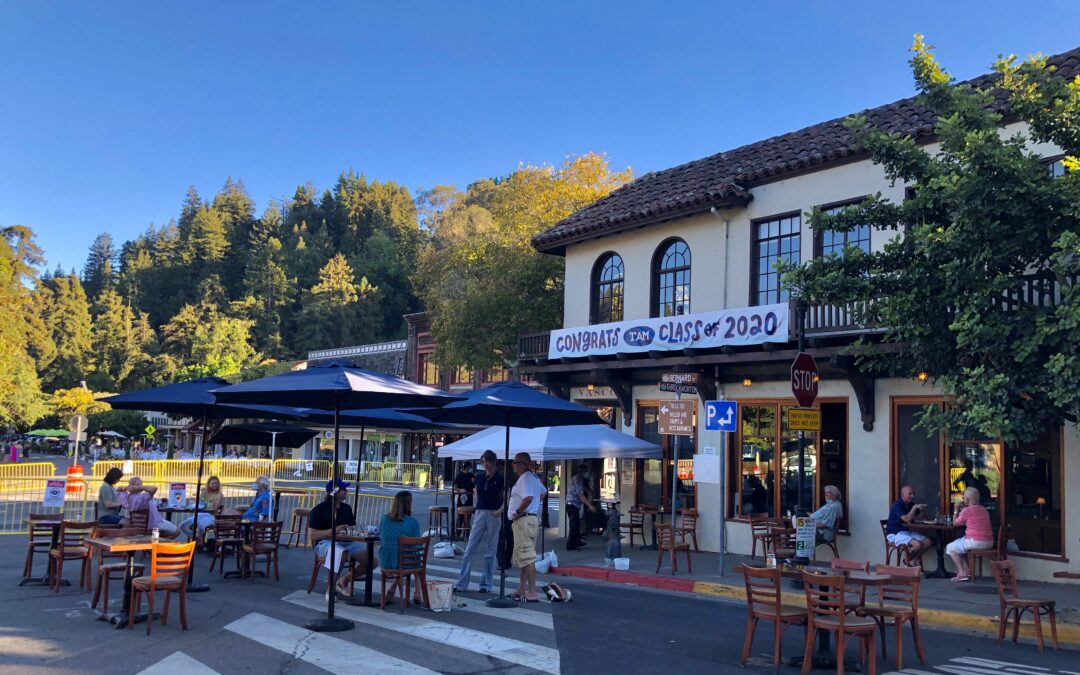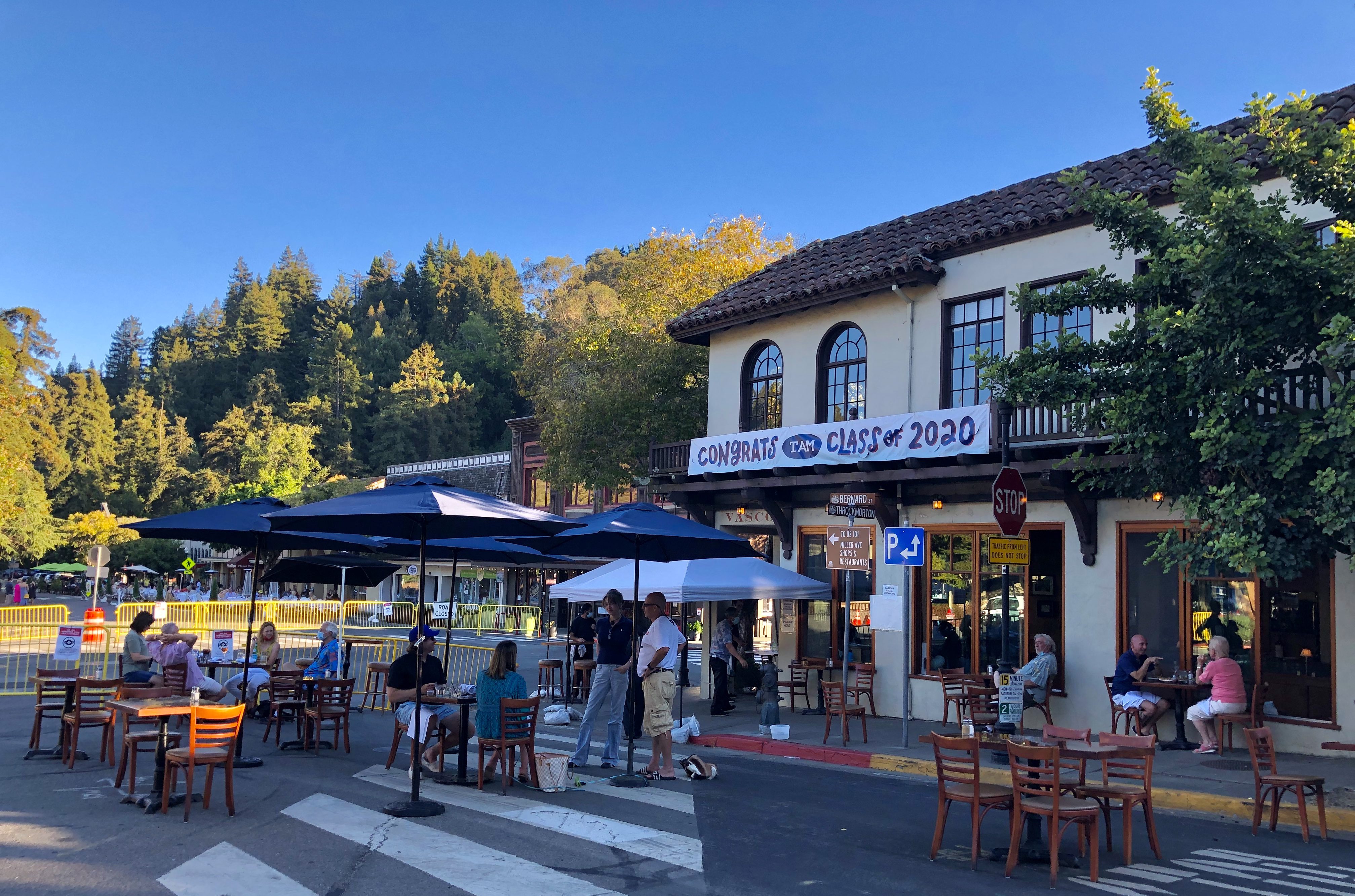On the heels of a feverish legislative session in Sacramento, Gov. Gavin Newsom has signed a whopping 770 new California laws and vetoed 66. The whiplash-inducing slate of new laws span nearly every subject imaginable, from making ethnic studies a high school requirement and requiring menstrual products in public schools to ensuring police can’t block journalists from covering protests and demonstrations and ending “surprise billing” for COVID-19 tests and vaccinations.
We’ve long been tracking a trio of bills designed to provide flexibility to restaurants and bars whose business models have been so ravaged by the COVID-19 crisis, as Mill Valley businesses have benefited greatly from a partnership between the Mill Valley Chamber and the City of Mill Valley that has focused on nimbly processing applications for use of both public and private space, including temporary parklets, street closures and converting outdoor spaces like parking lots into safe, convenient dining areas.
On Oct. 8, Newsom sign all three:
- Assembly Bill 61 by Assemblyman Jesse Gabriel (D-Encino) and SB 314 by Senator Scott Wiener (D-San Francisco) give businesses that temporarily expanded their premises under this regulatory relief a one-year grace period after the end of the statewide emergency order to apply for permanent expansion. Newsom has urged local governments to facilitate outdoor dining through local zoning and programs that support and promote expanded open-air, take-out and delivery options. AB 61 authorizes the ABC to permit restaurants to serve alcohol in an expanded license area and enable more outdoor food preparation and service, allowing restaurants to better use their own spaces for increased outdoor dining capacity. It also extends the period of time during which the COVID-19 permit is valid beyond 365 days if the licensee has applied for permanent expansion of their premises. The bill would make these provisions effective until July 1, 2024. AB 61 includes an urgency clause and thus goes into effect immediately.
- Senate Bill 314, authored by Wiener (D-SF), allows for the continuation of outdoor dining and parklets with alcohol post-pandemic, and grants businesses with temporarily expanded premises a one-year grace period to apply for a permanent expansion. The law also creates open container zones and streamlines the process for bars and restaurants to acquire a liquor license from Alcoholic Beverage Control. The issuance of a catering authorization for use at any one premises would be limited to 35 events in one calendar year, and alcohol sales would be limited to alcoholic beverages that the licensee is authorized to sell at the premises under their license. Licensees still need to obtain consent from the ABC for each event.
- SB 389 from Senator Bill Dodd (D-Napa) allows restaurants, bars, breweries and wineries that sell food to offer to-go alcoholic beverages with food orders through December 31, 2026.
“Neighborhood restaurants are the backbone of communities across California, but too many are barely hanging on by a thread,” Gabriel said in a statement. “Outdoor dining has been a critical lifeline that has helped these establishments keep their doors open during these challenging times. AB 61 provides important flexibility so that restaurants can safely expand outdoor dining and continue to serve the communities they call home.”
“The hospitality industry has been hit hard by the pandemic, and it’s important we make changes to modernize our entertainment and hospitality laws to allow them more flexibility and more ways to safely serve customers,” Weiner added. “This is a pathway for these businesses to, frankly, make up for a lot of the constraints that have been imposed on them over the course of the last 18 months,” Newsom said at a news conference at an Oakland restaurant.
One of the biggest forms of relief to come in the trio of bills is the one-year grace period in which to keep those outdoor setups — and in which to apply for permanent extensions for those licenses to the outdoors. That means that once local emergency declarations are lifted, post-pandemic, restaurants and bars that are currently offering outdoor seating in alleyways, parklets, and on sidewalks can continue for at least a year after that, if not longer.
“This expanded outdoor seating and service area has allowed restaurants and bars to survive and has been wildly popular with the public, with a more European street life feel,” Wiener said in a statement.
In February, Marin IJ columnist Dick Spotswood wrote, “easing post-prohibition era alcohol rules should continue. Drunken driving and under-21 alcohol use didn’t spike just because cafes were allowed to sell adults ‘drink at home’ bottles of wine or cocktails.”
Spotswood added that, “during the pandemic, Marinites discovered the wonders of outdoor dining. Due to our mild Mediterranean climate, enjoying meals and beverages on sidewalk tables or newly fashioned parklets became a popular option that will outlast shelter-in-place rules. Surprisingly, even when that practice led to partially closing downtown streets, only minor traffic impacts resulted. Unnecessary bureaucratic hurdles and fees that long limited outdoor dining to proprietor-owned patios ought to evaporate.”


